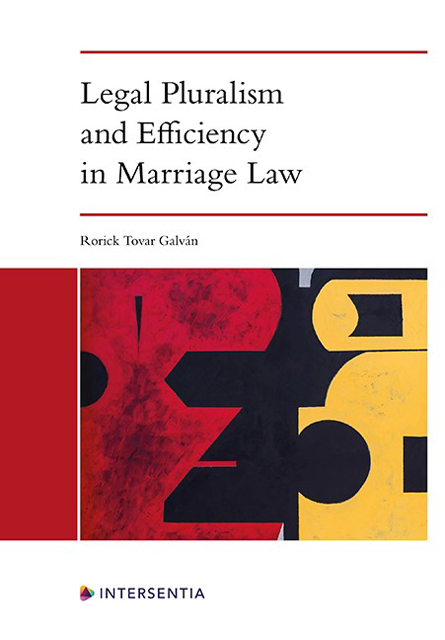Book contents
- Frontmatter
- Dedication
- Miscellaneous Frontmatter
- Foreword
- Preface
- Acknowledgments
- Contents
- List of Cases
- Introduction: Uncertainty and Inconsistency Surrounding the Determination of the Applicable Law in the EU Instruments on Matrimonial Issues
- Part I Economics As A Point Of Departure To Explain The Substantive Rules On Matrimonial Issues
- PART II Economics as a Point of Departure to Build a System of Conflict of Laws For Matrimonial Issues
- Conclusion: Certainty, Precision, Coherence, and Simplicity in the Determination of the Applicable Law
- Bibliography
- Index
- About the Author
Chapter 2 - Explaining Enforcement of Promises in Substantive Marriage Law from an Economic Perspective
Published online by Cambridge University Press: 17 December 2022
- Frontmatter
- Dedication
- Miscellaneous Frontmatter
- Foreword
- Preface
- Acknowledgments
- Contents
- List of Cases
- Introduction: Uncertainty and Inconsistency Surrounding the Determination of the Applicable Law in the EU Instruments on Matrimonial Issues
- Part I Economics As A Point Of Departure To Explain The Substantive Rules On Matrimonial Issues
- PART II Economics as a Point of Departure to Build a System of Conflict of Laws For Matrimonial Issues
- Conclusion: Certainty, Precision, Coherence, and Simplicity in the Determination of the Applicable Law
- Bibliography
- Index
- About the Author
Summary
The previous chapter concluded that the aim of contract law is facilitating the realization of agreements between individuals. This conclusion is based on the idea that voluntary exchanges not only improve the situation of the people involved, but they also assure a suitable allocation of the resources in a society. As long as these exchanges do not negatively affect individuals that have not chosen to incur these costs, they ought to be supported by the law. Party autonomy seems to be the corner-stone of the economic and legal system. In the case of marriage, however, spouses do not enjoy the same freedom that people in contract law have. There are significant restrictions on the specific obligations they can agree on in the framework of their marital relationship. Furthermore, the consequences of the termination of a marriage are unique when comparing them to transactions concluded in regular markets. If marriage is a contract, it is then necessary to explain why these differences exist. The first section of this chapter focuses on the reasons why not all promises between spouses must be legally enforced. The second explores the economic rationale behind the remedies commonly provided by marriage law
ECONOMIC RATIONALE BEHIND THE DETERMINATION OF ENFORCEABLE PROMISES
The law provides legal means with which individuals can enforce their promises to one another. Promises come in all varieties, including promises to provide a good in exchange for money; promises of employment; promises to create a business; and, of course, the promise of being together in sickness and in health, until death do us part. One can also think of promises like staying faithful, quitting smoking, respecting the partner or keeping them company. The key question is: Which promises should be legally enforceable – or to be more specific – which arrangements deserve the protection of the legal system?
SPECIALIZATION IN THE ADMINISTRATION OF JUSTICE AS A COST FACTOR
In 1776 Adams Smith explained the gains of productivity through the division of work. Using a pin factory as an example, he argued that producing pins in a system where the entire process is divided up among the workers would generate very large increases in productivity. According to him, the key factor affecting the productivity is the amount of time that workers spend switching from one task to another. A division of work allows them to focus on a narrow range of tasks and so gain much more experience and ability to perform their activity efficiently.
- Type
- Chapter
- Information
- Legal Pluralism and Efficiency in Marriage Law , pp. 63 - 82Publisher: IntersentiaPrint publication year: 2022



